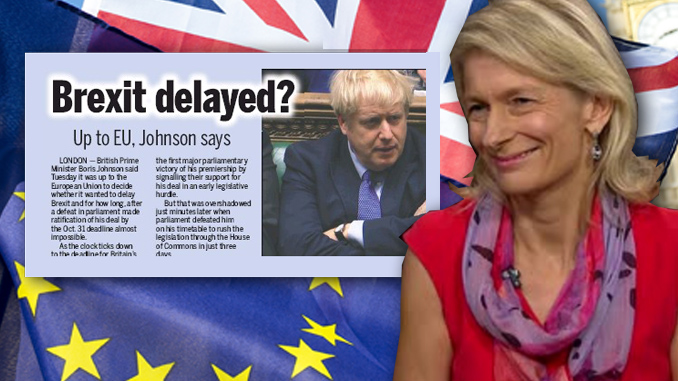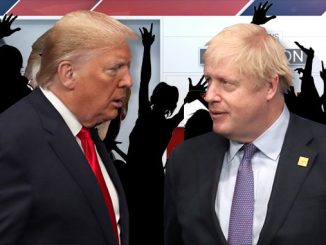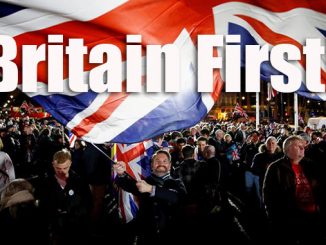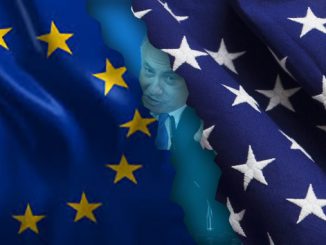
By Mark Anderson
CHICAGO, Ill.—The appearance of Zanny Minton Beddoes, editor-in-chief of The Economist, at a luncheon of the Chicago Council on Global Affairs (CCGA) on Oct. 4, was handled carefully. Besides the fact that the Windy City’s big-box media greeted her timely remarks about Brexit with silence, the highly influential CCGA was careful to introduce her as the head of a stridently internationalist publication. There was nary a word, however, about her membership on the Bilderberg Steering Committee and her steady attendance at the annual Bilderberg meetings as part of a media coterie that attends the hyper-exclusive gatherings but papers over the existence of such meetings and masks their agenda.
Minton Beddoes addressed Brexit rather cryptically, giving an insider’s look at the British exit from the European Union that could happen Oct. 31. As she discussed Brexit with CCGA Vice President of Studies Brian Hanson, she adopted a fragile pretense of neutrality that held for much of the luncheon. But that pretense discernably unraveled as she explored Brexit’s complexities while responding to a key question from this writer.
Bringing up a hush-hush matter that the anti-Brexit establishment steadfastly avoids, this writer asked her about the growing UK-EU military union—which hardwires the UK into the EU in a prolonged fashion—and inquired whether that union could result in a Brexit that’s only an exit on paper, but which cannot be fully consummated. This writer also asked whether it’s possible to extricate Britain from the EU when much of the EU’s complex body of rules and regulations has been integrated into the British legal code.
The British-born editor’s reply to the two-part question quickly snowballed and became convoluted, likely because the Bilderberg-aligned Economist, like most of the Western press, is so overwhelmingly opposed to Brexit—despite her noted attempt at objectivity—that establishment editors get a bit off-balance when asked unusual questions. Accordingly, Minton Beddoes tended to overstate the matter.
“Both sides will see it within their interest to maintain as close links as possible,” she claimed. “But the EU is a rules-based organization. And all of these links have been built up on the basis of [the UK] being a member state of the EU, as a result of which certain legal obligations and rights come. If we’re no longer a member, then that is ended.”
She added: “And so, we have to kind of rebuild those links, and that will take an enormous amount of time. And how easily it’s done depends on whether there’s willingness to negotiate that—willingness on both sides—and that, in turn, I think, depends on the terms of our departure. So, if we have a negotiated withdrawal—where this is done over many years and there’s a transition period—[with] all the things that were in the withdrawal agreement that [former PM] Theresa May negotiated, and could be if there’s an agreement with Boris Johnson now, then this stuff becomes the work of many bureaucratic hours.”
 Notably, her words “when this is done over many years” were perhaps a slip. That suggests that “the fix” may be in regarding the suspected elite tactic to drag out Brexit so long that another referendum could happen in order to negate the June 2016 Brexit referendum in which voters opted to leave the EU 52% to 48%.
Notably, her words “when this is done over many years” were perhaps a slip. That suggests that “the fix” may be in regarding the suspected elite tactic to drag out Brexit so long that another referendum could happen in order to negate the June 2016 Brexit referendum in which voters opted to leave the EU 52% to 48%.
She went on to address this writer: “You’re right. In many areas, we will want to maintain those links and the Europeans will also want to maintain those links, but that will have to be rebuilt.”
In response to a basic question from Hanson—“Why is Brexit so hard?”—Minton Beddoes replied: “Thanks to the creation of the European Single Market, which the British championed and were the great driver for creating, British manufacturing is incredibly integrated [with the EU].”
She also cited the “enlargement of the EU”—which The Economist champions—as another factor, along with heavy immigration.

“We’ve had a huge number of people come [to the UK] from other countries. . . . Brexit is like having a divorce after several decades of marriage.”
Another thing that complicates Brexit is that “parliamentary sovereignty”—where elected members of Parliament make the decisions—was “outsourced” to the people in the form of “direct democracy” via the Brexit referendum, she said, with a hint of disregard for the legitimacy of the 2016 Brexit vote.
This happened, she continued, because an “element within the Tory [conservative] Party” has never been cozy with Britain being in the EU, and former Prime Minister David Cameron had to placate that element for political purposes.
That, in turn, opened the door for “a very large, disgruntled group of Britons to exercise a protest vote,” Minton Beddoes also stated, once again jabbing the pro-Brexit electorate’s vote as one of mere anger that lacks substance and solutions—a common, flawed refrain from Bilderberg and ideologically connected think tanks like the CCGA when discussing anti-globalist populist movements.
Minton Beddoes then effectively revealed her “Bilderberg hand” by floating the distinct possibility of a second referendum. While reiterating that the actual UK exit from the EU is supposed to happen Oct. 31, she said the British Parliament is stipulating that if there’s no written agreement in place to guide the Brexit process by around Oct. 19, then an extension beyond Oct. 31 will be required. That, she said, could lead to Parliament issuing a “vote of no confidence” in new Prime Minister Boris Johnson and force a second referendum that could overturn Brexit.
Mark Anderson is AFP’s roving editor. Email him at [email protected].




